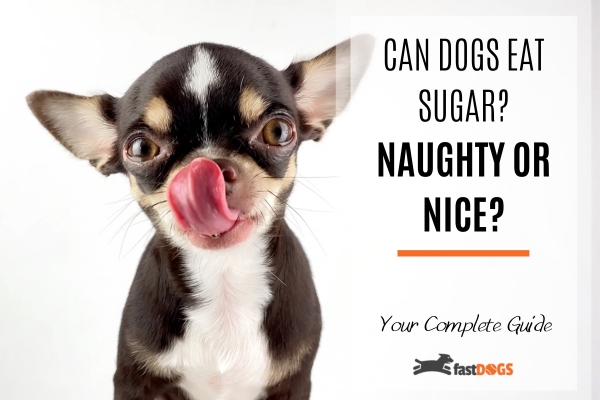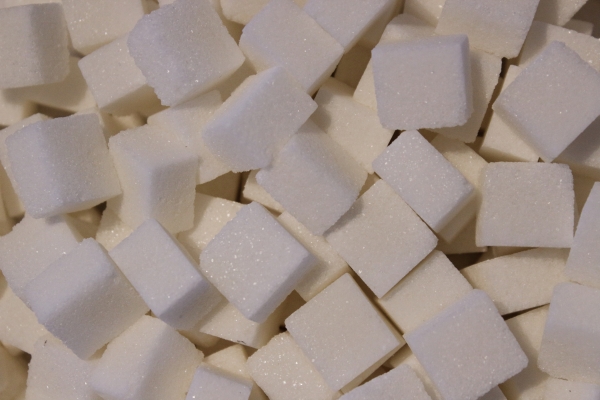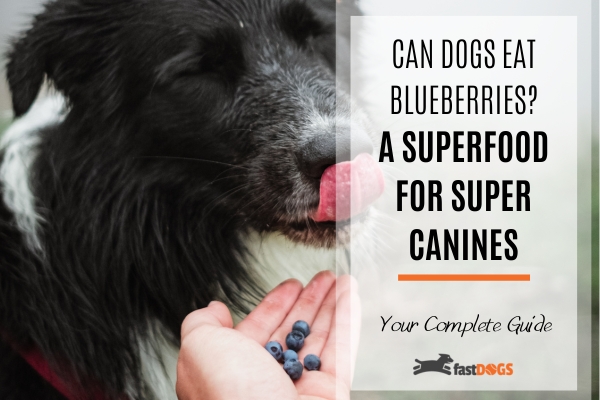Can Dogs Eat Sugar? Naughty or Nice?

Can Dogs Eat Sugar? The Health Risks of Sugar for Dogs With a Sweet Tooth
From freshly baked cookies and cupcakes to candies and soda drinks, sugar just seems to make everything taste better. But what happens when the four-legged member of your family develops a sweet tooth?
Can dogs eat sugar? We know sugar isn’t too good for us, but should we be allowing our canine friends to share in this unhealthy obsession we have with all things naughty but nice?Can Dogs Eat Sugar? Contents

Can Dogs Eat Sugar?
Technically, yes. But, the answer isn’t completely straightforward. Sugar isn’t poisonous to dogs, but too much isn’t too good for your pooch either.
A recent study found that sugar is quickly replacing fat as public enemy number one in public health campaigns. Yet we still tend to overindulge in this sweet treat.
So, although a dog can have sugar, giving your dog foods containing added sugars or feeding them raw sugar isn’t wise.
Can Dogs Have Powdered Sugar?
If you’re baking, you’ll no doubt use powdered sugar (confectioner’s sugar) for the finishing touches. Keep it for your cake, not for your canine.
It’s still a form of sugar, which quickly releases into your dog's bloodstream and can cause digestive issues. The term ‘powdered’ refers to how fine granulated sugar has been ground.
Can Dogs Eat Brown Sugar?
Although calorie wise there’s not too much difference between brown and white sugar, brown isn’t quite so calorie-laden. Plus, brown sugar contains minerals thanks to the molasses, while white sugar is full of empty calories.
Remember though, brown sugar is still sugar and should be treated the same as white sugar – ie, don't add any to your dog's diet!
When Is Sugar Good for Dogs?
This is where it gets confusing! Just like us humans, our canine friends also need some source of energy for their bodies to function healthily. As omnivores, most of your dog’s energy requirements come from carbohydrates, which are broken down into glucose in their bodies.
According to the AAFCO (Association of American Feed Control Officials), which publishes the required nutritional guidelines for canines, there is no need for any extra sugars in a dog’s daily diet. Carbohydrates tend to be readily available in most canine diets, with protein and fats also providing additional sources of energy.Why Is Sugar Bad for Dogs?
Not all sugars are the same. The most common type of sugar you’ll find in processed foods, candies, or sodas will be sucrose.
Often called table sugar or granulated sugar, sucrose consists of both glucose and fructose (found in fruits). Your pooches digestive system is responsible for breaking down these simple sugars, which as they’re absorbed quicker, will give your pooch a short-term energy boost but offer no nutritional value.
Glucose raises blood sugar, so the body must use insulin to metabolize it. In contrast, fructose doesn’t. Instead, the liver breaks it down.
Fiber and starches, by comparison, take much longer for the body to break down and will release the essential glucose much slower — allowing the body to better metabolize it.
Although humans can tolerate moderate amounts of sugar, your canine companion is much more sensitive to large amounts of added sugars.

How Is Sugar Harmful to Dogs?
Although picking up the odd sugar cube from the floor won’t pose too much risk to your pooch, consuming large amounts of sugar may cause various health issues over time.
Short-Term Health Issues
In the short term, excessive amounts of sugar can be hard for your furry friend’s digestive system to cope with. Just like humans, canines rely on bacteria and other flora in their guts to help them properly digest food. Too much sugar too quickly can upset that balance and result in:
Stomach upset.
Bloating.
Diarrhea.
Vomiting.
Long-Term Risks
If dogs should regularly consume large amounts of sugar over a longer period, long-term metabolic health issues may develop. It can lead to weight gain and obesity, and all the problems that go along with an unhealthy weight, including:
Lethargy.
Joint problems.
Higher blood sugars and possible diabetes.
Heart disease.
Systemic inflammation.
Both pancreatitis and diabetes can be life-threatening for your pooch.
Dental Health Issues
Too much sugar can have a negative impact on your canine’s dental health. Bacteria living in the mouth of your pup thrive on sugar and produce acids that can eat away at the enamel of their teeth and often cause gum disease. Most dog owners don’t relish the idea of paying for expensive dental cleaning treatments or procedures for their pooch.
Do Dogs Like Sugar?
Dogs don't have as many taste buds as humans, about 1,700 compared to our average 9,000, but they still have the same taste receptors. Dogs can experience the flavors of saltiness, spice, sourness, bitterness, and of course, sweetness.
Although your pooch may not enjoy anything that’s too bitter, spicy, or sour, most pups will enjoy that sweet flavor. It’s why so many pups enjoy fruits and veggies or start hanging around when you get those candies or chocolates out.
When Is Sugar Toxic to Dogs?
Although sugar is not poisonous to dogs, many artificial sweeteners or sugar replacements are — including xylitol. And, as you’re looking into what dogs can and can’t eat, you’ve likely come across this word many times. But is it really that bad for your pooch, and why is it so bad?
A naturally occurring sugar alcohol, xylitol is widely used as a low-calorie option for sugar, with the main side effect for humans being a slightly mild laxative effect if consumed in large quantities. However, for dogs, xylitol is extremely toxic.
Both humans and canines control their blood sugar levels by the release of insulin from the pancreas — but the similarities end there.
While xylitol doesn’t stimulate any extra insulin release from the pancreas in humans, it does in dogs — and we’re talking potent levels. As a result, it could lead to a severe drop in blood sugar levels (hypoglycemia).
Signs of xylitol poisoning include:
Nausea/vomiting.
Tiredness.
Lack of coordination/balance.
Weakness.
Seizures.
Liver failure.
Collapse.
Death.
In short. Don’t give your pooch anything containing xylitol. And, if you suspect your pup has consumed any xylitol — consult your vet as soon as possible.

Can Dogs Eat Sweets?
Stop, no, and don’t. Candy or lollipops are high in added sugars, plus they offer zero nutritional value. What’s more, they could also contain toxic ingredients such as xylitol, nutmeg, or raisins.
Can Dogs Eat Chocolate?
While a go-to sweet snack in many households, it often poses a double risk for your pup’s health.
Most dogs love chocolate, but it contains theobromine, a natural substance from the cocoa plant and a relative of caffeine. Although humans can process this chemical, dogs are far more sensitive, with just a portion of 2.5 ounces (70 grams) often causing serious illness or even death in a 22-pound dog.
Can Dogs Eat Sugar-Free Candy?
In general, you should avoid feeding your furry companion anything that’s labeled as sugar-free, especially candies. Candy is sweet for a reason, and once they remove that sugar, the manufacturer has to replace it with another sweetener.
Some sweeteners such as aspartame, may seem safe, but they’re often combined with xylitol, which as we’ve seen is highly toxic for dogs.
What About Natural Sugars?
Many fruits like blueberries, watermelon, or bananas contain naturally occurring sugar and are considered dog-friendly fruits. The sugar content found in these fruits tends to be moderate, and as the fruit contains water and fiber, it slows down the absorption by your dog’s digestive system.
When served in moderation, i.e., less than 10% of your dog’s daily caloric intake, dog-safe fruits can help keep your dog’s sweet tooth satisfied. The nutrients in the fruit are a bonus too.
Can Dogs Eat Sugar Cane?
Although sugar cane isn’t considered poisonous for dogs, the raw cane isn’t a suitable substitute for a chew toy. Typically 100 grams of sugar cane contains 74 grams of sugar, and the fibrous stick can be a potential choking or intestinal blockage hazard.
Final Thoughts
If your dog plays the guilt-trip card when you’re eating candy — ignore them. Remember, your pooch has different nutritional needs than you. While dogs can handle a certain level of sugar in their diet, it’s crucial to be cautious and avoid feeding them sugary treats meant for human consumption.
Can dogs eat sugar? Although the answer is technically yes, we’re talking about natural sugars in fruits and vegetables and in very small amounts. Too much sugar can cause stomach distress in the short term, but long term, it can have far more serious consequences. And, give xylitol a wide berth.
Can Dogs Eat Sugar? FAQs
What Happens If Dogs Eat Sugar?
In smaller amounts and very occasionally your dog shouldn’t experience too many issues. The odd bite of a cupcake or maybe a dropped lollipop isn’t going to kill your pooch.
However, table sugar and sweeteners are not part of a dog's natural diet. Consuming large quantities of sugar can lead to gastrointestinal distress, and you may observe symptoms like vomiting, diarrhea, gas, and overall discomfort.
Can Dogs Eat Biscuits?
Generally, biscuits pose minimal risk as a snack for your furry companions, as long as they’re given in controlled amounts. However, excessive consumption of sugary treats over a prolonged period can lead to undesirable weight gain.
Always ensure any biscuits (store-bought or homemade) don’t include harmful ingredients, such as chocolate, nutmeg, or xylitol, which are toxic for canines.
Can Dogs Eat Honey?
Raw, unprocessed honey is much healthier for your pup than processed or granulated sugar, as it’s a source of many vitamins and minerals.
Honey is sweet, filled with antioxidants, and provides the benefits of several vitamins and minerals. Many dog owners use it to treat a pup's sore throat, although remember it is a sugar and should only be served in moderation.
Is Water With Sugar for Dogs Safe?
You might have come across recommendations for using sugar water to address hypoglycemia (low blood sugar level) in dogs and puppies. However, this approach is not endorsed by veterinarians. Instead, they’re more likely to advise providing a high-protein meal as a suitable solution.


